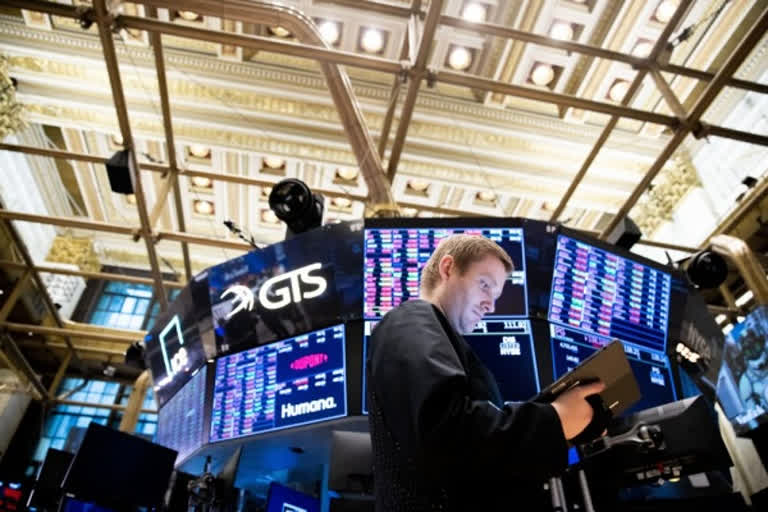New York: World markets slipped on Wednesday after Wall Street fell the most since June 2020 as a report showed inflation has kept a surprisingly strong grip on the US economy. European benchmarks were marginally lower while Asia saw bigger losses. US futures edged higher, with the contracts for the Dow industrials and the S and P 500 up 0.3 per cent. European futures were lower.
Tuesday's report showed US inflation slowed only to 8.3 per cent in August, instead of the 8.1 per cent economists expected. That dashed hopes that inflation was falling back to more normal levels after peaking in June at 9.1 per cent, allowing the Federal Reserve to moderate its interest rate hikes. Now, traders are bracing for the Federal Reserve to ultimately raise interest rates more than expected to combat inflation, with all the risks for the economy that entails.
Germany's DAX lost 0.2 per cent to 13,165.86 and the CAC 40 in Paris gave up 0.3 per cent to 6,2275. Britain's FTSE 10 shed 0.7 per cent to 7,334.75. The futures for the Dow industrials and S and P 500 both were down about 0.3 per cent. Tensions between the US and China also were weighing on sentiment. Chinese leader Xi Jinping and Russian President Vladimir Putin are due to meet later in the week, underscoring the countries' warming ties as the West pushes ahead with sanctions against Moscow for its invasion of Ukraine.
The meeting Thursday in Samarkand, Uzbekistan, on the sidelines of a summit of a security pact dominated by Moscow and Beijing, reflect the strong ties between the former Communist rivals now locked in rivalry with the US. The US is meanwhile reportedly considering new sanctions against Beijing aimed at deterring aggression against Taiwan, a self-governed island democracy that China claims as its own territory.
Hong Kong's Hang Seng index lost 2.3 per cent to 18,875.59 and the Shanghai Composite index declined 0.8 per cent, to 3,237.54. Tokyo's benchmark Nikkei 225 lost 2.8 per cent to 27,818.62, while Sydney's S and P/ASX 200 declined 2.6 per cent to 6,828.60. In Seoul, the Kospi lost 1.6 per cent to 2,411.42. On Tuesday, the Dow lost more than 1,250 points and the S and P 500 sank 4.3 per cent. Tuesday's hotter-than-expected report on inflation.
The Nasdaq composite closed 5.2 per cent lower. Bond prices also fell sharply, sending their yields higher. The yield on the two-year Treasury, which tends to track expectations for Fed actions, soared to 3.74 per cent from 3.57 per cent late on Monday. The 10-year yield, which helps dictate where mortgages and rates for other loans are heading, rose to 3.42 per cent from 3.36 per cent.
Traders now see a one-in-three chance the Fed may hike its benchmark rate by a full percentage point next week, quadruple the usual move. The Fed has already raised its federal funds rate four times this year, with the last two increases by three-quarters of a percentage point. The rate is currently in a range of 2.25 per cent to 2.50 per cent.
Higher rates hurt the economy by making it more expensive to buy a house, a car or anything else usually purchased on credit. Mortgage rates have already hit their highest level since 2008, creating pain for the housing industry. The hope is that the Fed can pull off the tightrope walk of slowing the economy enough to snuff out high inflation, but not so much that it creates a painful recession.
Tuesday's data casts doubt on hopes for such a soft landing. Higher rates also hurt prices for stocks, bonds and other investments. Expectations for a more aggressive Fed have also helped the dollar add to its already strong gains for this year. The dollar has been surging against other currencies in large part because the Fed has been hiking rates faster and by bigger margins than many other central banks.
That's especially true for Japan, where the benchmark rate remains at minus 0.1 per cent. The dollar bought 143.47 Japanese yen, down from 144.57 yen late on Tuesday. The euro rose to 0.9981 cents, up from 0.9969 cents. US benchmark crude lost 47 cents to USD 86.84 per barrel in electronic trading on the New York Mercantile Exchange. It lost 47 cents to USD 87.31 on Tuesday. Brent crude, the international pricing standard, gave up 53 cents to USD 92.64 per barrel. (AP)



